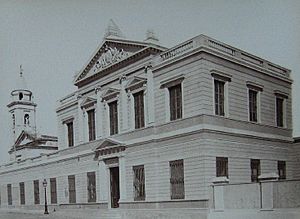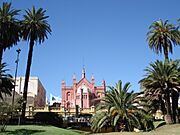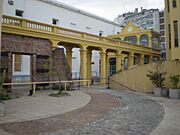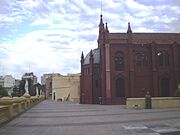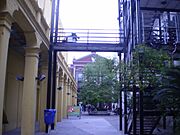Centro Cultural Recoleta facts for kids
Quick facts for kids Recoleta Cultural Center |
|
|---|---|
|
Centro Cultural Recoleta
|
|
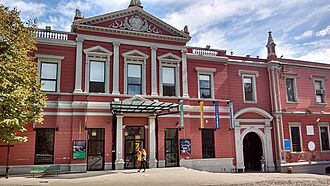
Main facade of the CCR
|
|
| General information | |
| Address | Junín 1930 |
| Town or city | Buenos Aires |
| Country | Argentina |
| Construction started | 1980 |
| Owner | City of Buenos Aires |
| Design and construction | |
| Architect | Juan A. Buschiazzo |
The Centro Cultural Recoleta (which means Recoleta Cultural Centre in English) is a lively place in the Recoleta neighborhood of Buenos Aires, Argentina. It's a special building where you can see amazing art, enjoy concerts, and take part in different workshops. It's a hub for creativity and fun!
In September and October 2006, the center hosted the very popular onedotzero festival. This event attracted over 20,000 people in just three days. Visitors enjoyed art installations, live performances, film screenings, and music.
Contents
History of the Recoleta Cultural Center
The building that is now the Recoleta Cultural Center has a long and interesting past. It was first given to a group of monks called the Franciscans in 1716. The plans for the building were drawn by two architects from the Jesuit order, Juan Krauss and Juan Wolf. The beautiful front of the building and its inside designs are thought to be the work of Andrés Blanqui.
From Monastery to Public Use
The building was finished in 1732, making it one of the oldest structures in Buenos Aires. Over time, its purpose changed a lot. In the early 1800s, after Argentina's May Revolution and its declaration of independence, the building took on new roles.
Manuel Belgrano, an important figure in Argentine history, started a drawing school there. Later, in the 1870s, it became a shelter for people who didn't have homes.
Important Renovations and Design
Torcuato de Alvear, who was the first mayor of Buenos Aires, helped make the Recoleta area more beautiful, including this building. An architect named Juan Antonio Buschiazzo gave the building an Italian look. He also designed the chapel, which is now used as an auditorium for events.
The building had another big makeover around 1980. This renovation was led by famous architects Clorindo Testa, Jacques Bedel, and Luis Benedit. Their plan was to turn the historic building into the cultural center we know today.
Gallery
See also
 In Spanish: Centro Cultural Recoleta para niños
In Spanish: Centro Cultural Recoleta para niños
 | Janet Taylor Pickett |
 | Synthia Saint James |
 | Howardena Pindell |
 | Faith Ringgold |


